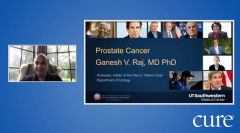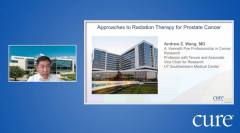
Educated Patient® Prostate Cancer Summit Treatment in Localized Disease Panel: May 21, 2022
Watch Dr. Ganesh Raj, Dr. Andrew Z. Wang, and Bruce Williams, discuss treatment for localized disease, during the CURE Educated Patient Prostate Cancer Summit.
Episodes in this series

This panel was moderated by Dr. Tian Zhang, and featured Dr. Ganesh Raj, Dr. Andrew Z. Wang, and Bruce Williams.
Zhang: I would like to kick it off by asking Bruce to tell us a little bit about your journey with prostate cancer and tell us about your background.
Williams: Okay. I'm a retired banker, so definitely not a medical professional. And in 2018, I had a radical prostatectomy. Davinci robotically assisted. Twenty-seven months later, I had a biochemical recurrence. Watch that with a series of ultra-sensitive PSA tests. Then in May, after the PSMA pet was approved at UCLA, I had a PSMA PET CT that identified some oncological activity at a presacral lymph node. So I followed that up with four months of Ella guard who has a single injection, 30 milligrams, and then 330 sessions of IMRT. And so now you know, I'm at a very low level of PSA. It's presently 0.0 to zero. So attempt of undetectable. So that's pretty much it for my for my journey to this point.
Zhang: Thank you so much, Bruce, for sharing that with us. It sounds like you've really had multimodality approaches, surgery, radiation, hormone therapy. So we've seen it all. Great.
Well, I do see a couple of questions in the chat. And feel free to put in more questions to the right of your screen there for the messages. We will start with asking a bit about side effects. It sounds like there are quite a few questions about side effects. So Dr. Raj, Dr. Wang, if you can comment about long-term side effects of either surgery for Dr. Raj, and then long-term side effects of radiation for Dr. Wang. Dr. Raj, why don't you kick us off?
Raj: Sure. The simplest answer is, I mean, the long-term side effects of surgery historically have always been intraoperatively. During the surgery, the blood loss. And then postoperatively, the incontinence and erectile dysfunction. So those are the three typical side effects of surgical intervention with the robotic surgery.
Pre-robotic surgery, the open surgery used to be one out of three patients or one out of two patients, had required a blood transfusion after surgery, depending on who did the operation or whatever else. So blood transfusions after surgery in the open surgeries was not uncommon. However, in the in the robotic case, since the advent of the robot, it's almost unheard of to have a patient undergo transfusion. It's extraordinarily rare for a patient to undergo transfusion after surgery. So most patients lose about 100 cc's of blood, which is less blood that you would lose than if you went to Red Cross to give blood. And so transfusions out of the window.
So the second part is about continence, that is, can you control your urine without leaking when you just stand up and go for a walk, and a vast majority of patients with the technological improvements of the robot. And with the anatomical approach, a vast majority of patients have incontinence have complete continance after surgery within six months.
Which brings us to the third part, which is erectile dysfunction. And the erectile dysfunction, again, it depends on the patient before surgery. If the patient pre surgery had good erectile function, and the cancer is away from where the nerves are, and you're able to save the nerves, the vast majority of patients will regain erectile function. Now one important thing to remember is that the erectile function after surgery is different than erectile function before surgery. When you remove the prostate, there is no more interaction when you have an orgasm, so it's an ejaculation briquettes are dry orphans, I tell my patients, it's all the fun and none of the mess.
Zhang: That's a very interesting approach. Dr. Wang, your comments on side effects for radiation?
Wang: Yeah, so similar, right. So prostate cancer treatment can affect urinary function. So, long term side effects of separating urinary function, erectile dysfunction. And then there are some rare but, you know, potentially applicable to radiation side effects. So starting with urinary function, you know, our bodies built where the default is actually not to release urine. So, unless their anatomy changes, so, unlike surgery, where the past because of the anatomy changed, there is a possibility of more free flow, radiation, we don't change anatomy. So we don't make your free flow, but we don't make you urinate easier. And that sometimes can be a problem. So the surfer for patients who have good urinary function, then they should expect good urinary function following treatment.
On the flip side, in patients who have difficulty with urine donation, you know, radiation can be more challenging, especially if it's really difficult for patients, then we could cause more obstructive symptoms, and then, you know, the possibility what we call overflow incontinence, which is that, you know, the bladder fills really for and then, you know, that overflow, that's extremely uncommon, rare, especially when you have a conversation between the radiation oncologist and, and the patient. But all in all is I will say is, long term, we tend to keep people where they are now, or a little bit, you know, frequent, but no major changes, at least based on the quality of life questionnaires that we have done.
The potency, or the erectile dysfunction, you know, there have been many studies, well, we can tell is about three or four years later, it's very comparable between surgery and radiation. And so, so it's hard to tease out, you know, as Dr. Raj said, there are a number of reasons that can cause that. And aging is part of it, treatment is part of it is complex, but for patients is just remember is that, you know, long term, the IDI problem is tend to be comparable among all treatment options.
Now, within radiation oncology, the different techniques I've talked to you about, there's just not enough data to say one is better than the other. So we don't really like theoretically, some should be better than others, but we don't have good data to support that yet. Other, you know, uncommon things. So one is that we do treat part of the bowel and bladder with some high dose radiation. Historically, it is rare, but it can happen is that the long term like 10 years down the road, there may be, you know, some bleeding, you know, patients have a hard bowel movement, or, you know, the last drop of urine could be a little pink. And that has really dramatically reduced with better technology, like I said, is the IGRT and other things were reducing treatment, but that risk is still there, not zero. And then it's easy to if, if patients have a complication with that, and, and it's bothersome, they can laser, this is what I described as spider veins, you know, get rid of that, and then mitigate that risk.
And then very last part, I always say, you know, people hear radiation, and we were associated with cancer, because, indeed, radiation, theoretically can cause a cancer of its own, that risk is extremely low, especially in grown adults, we're, you know, as we know, there's prostate cancer, you know, the average age is, you know, in the 60s, right, so that that's, you know, what I cancel all my patients is that, you know, radiation doesn't cause cancer everywhere, it only causes cancer in the area that that's had radiation. And if you really think about prostate cancer treatment, the high risk part is really the GI tract. And I always ask my all my patients to have colonoscopies and, you know, screening, and if you do that, I think that risk is really pretty, you know, baseline to the population. And by the way that the guideline for colonoscopy is 45. Now, so it's for all the patients out there, make sure you get your colonoscopy Um, and, and then also, you know, you know, if there are smokers, I will ask them to, you know, reduce that, you know, better health, to reduce the bladder cancer risk. So that those are really the big ticket items.
Zhang: Wonderful, and in part to think about other prevention strategies as well. Great.
We have a couple of questions about sequencing treatments, so we're going to group a couple of them together. So assuming there is a recurrence, what is the sequence of treatments that offer potentially the best results? Is it surgery, then radiation, radiation, then surgery? And then in vain? In that line? What are some of the complications of removing the prostate by surgery after you've already been treated, presumably with radiation? So why don't we start with the surgery and radiation approach? And ask Andy to comment on that, and then we'll talk about radiation, then surgery and ask Ganesh to talk about that. So Andy, want to start what about surgery first than radiation?
Wang: I see. So assuming just surgery has happened, and then the biochemical recurrence? So yeah, so this is a well-established paradigm. You know. So once there is evidence of PSA, you know, the standard of care is to go ahead and proceed with a course of what we call salvage radiation, as I mentioned, is the, for decades, we know that treating the prosthetic fossa where the radiation started, where the surgery was, where the prostate was, and where the surgery took place. You know, can you render many patients disease free. And then, as I showed in the sport trial, it showed now that the data shows that, you know, adding the lymph nodes and adding a short-term hand, hormone suppression, also improves outcome. You know, the most patients in this setting have very low PSA, as Bruce just pointed out. And so it's, I will say that it's very rare that an imaging modality will be able to find that recurrence. And so, you know, I would say that, yes, there is quite a bit of uncertainty in terms of, you know, where the disease recurrence is. So, we do have, you know, Nam grams and things like that to judge like, you know, based on PSA velocity, the velocity, the initial disease and things to guide as to, you know, the chance, but at the end of the day, the way I think about from a patient perspective, is there really, to me, you know, in the setting, there are only really two ways to think about this right.
One is to go ahead and do a course of salvage radiation, the other is really to wait and, and wait and see. But truth is that, you know, for most patients, the salvage radiation is the path that leads to better outcome. Just because you're in the wait and see the PSA is a doubling time, right? And so the two to the power is a very powerful math. And also, as the PSA number gets bigger, that doubling time gets shorter. And so with patient, you know, if patients have good life expectancy has good general health. And so in general is that just go ahead and do a course of salvage radiation. You know, where the understanding is, there may be some overtreatment. So that's how I think about, you know, salvage after surgery.
Zhang: Good and maybe, because we're in that salvage radiation after surgery. Bruce, would you comment too, about your patient experience? You had surgery first and follow up by radiation?
Williams: Thank you. from a patient perspective, it was pretty much a non-event. You know, there were certainly some mild side effects with the Bellegarde who provide acetate but everybody's different in their reaction to that but from the standpoint of the radiation that I experienced, was, you know, pretty much a non-event I went for 30 radiation visits; they were about 5-10 minutes apiece and No, it was pretty much a non-event.
Zhang: Overall very well tolerated. Excellent. I'm Dr. Raj, do you want to talk about what if patients have had radiation? And then how do you think about surgery after in a radiation field?
Raj: First I'll say I completely agree with that. But at least, and Bruce, I totally see your point of view of the patient experience being relatively seamless after surgery, but potentially getting radiation afterwards. And to us in many ways. That is the preferred approach we always think about, for a patient with high-risk prostate cancer, intermediate-risk prostate cancer, is think about surgery first, then after that, potentially, if you need it, you can potentially think about multimodality therapy, such as radiation, plus-minus hormonal therapy, but for us, if you want to switch the odds, it's not it's also a potential viable option. So let me go through that.
If you had radiation first, and then you have biochemical recurrence, that is the cancer has come back because your PSA is now going up? What do you do? Well, if you have evidence that the cancer is localized to the prostate, and not outside the prostate surgery, a salvage surgery, salvage process detective with the robot is actually an extraordinarily good operation. For patients this has higher degree of incontinence after radiation. But for the most part, it's an extraordinarily well tolerated operation, especially with the advent of the rope, pretty robotically, the because the plane was fused between the rectum and the prostate. It used to be extraordinarily hard to do that procedure because you'd not have the advantage of magnification. And the approach was often fraught with difficulty. Because of the way we do the prostate surgeries of the robot, the approach, we do it with the magnification.
The patients who have biochemical recurrence, confined to the prostate after radiation should not be condemned to a lifelong series of treatment with androgen deprivation therapy alone, they should be considered for salvage prospects. And I will tell you this, it all depends. Not everyone does a lot of salvage prospect. We are our institution, we do about 50 a year, which is, which doesn't sound like a huge number, considering the overall number of prostate surgeries that are done in the United States. And everywhere else, but 50 years makes us one of the top institutions in the world for the number of salvage case as we do here. So it so the key thing is first to recognize three things one, does the patient need treatment after biochemical recurrence? Or is the PSA going up quickly? Or is it going slowly? Could they be managed by surveillance? And second, is the cancel, localize to the prostate? And third, does the patient actually want the surgery? So because of those, those things, I would say the numbers of patients we operate out are about 50 a year. And we do a lot we probably do more than more of those cases than almost anybody else.
Wang: I just want point out that cryo and ablative technologies are also very good salvage options. So there is that. And then at one point of clarification is that the 50 cases are from outside institution treaty initially, just wanted to make that clarification.
Raj: And he's only been here for a few months, so we have not got one of his fails.
Zhang: So I want to ask one question that is I think on a lot of patients mind as they search for and receive treatment is that how would you guys approach? What questions should they ask surgeons or radiation oncologists, when they're looking for the right doctor to partner with them to treat their disease? And in any final comments if you can tie that together with a one-minute answer? We'll start with Ganesh.
Raj: Yeah, sure. I mean, I think what we talked about before surgeon experience matters. It's critically important to ask the surgeon, how many of these they've done, what their outcomes are, and how many you can talk to the patient or patients that they've operated on. And you can kind of get a sense of what on how you can, what you can expect from the surgery. And I think the one important thing to really, really hone in on was the fact that a vast majority of patients with low risk prostate cancer, do not need intervention, either surgery or radiation, and they can be managed with active surveillance. So do not have somebody sweet talk you into radiation or surgery, if you're a perfect candidate for active surveillance.
Wang: Yeah, so for me, I think, you know, second to Dr. Raj, is that, you know, expertise matters. But overall, I think, you know, one thing is, patients should take comfort in that there is no wrong choice here, right. So you're choosing among many great options, it is utterly unethical for us to let you choose if we think one is better than the other. So in this case, you have great options. But you know, the reason you have choices is that everybody's different. We all have our own preferences in terms of what we're willing to tolerate and side effects and all that. So focus on that, have a deep discussion, find caregivers, who can go into depth with you, and help you give you the right information for you to find that what makes sense for you, and you know, avoid rushing into a decision. Because it is, it is a personalized decision. But it does affect, you know, your life in a significant way. But, again, just take a step back, it's all great options, the outcome is very good for prostate cancer overall. And we're and then on our side is we're continuing to make innovations, try to make it even better.
Zhang: All right, good. And we'll ask Bruce, for the final word here. Bruce, what did you ask of your doctors when you went to see them and find the right person to treat your prostate cancer?
Williams: I think it's very difficult as a patient to find a lot of objective information on physician performance. So in terms of asking, you know, the physicians that you're considering for surgery, certainly, as Dr. Rogers said, you know, how many have you done? What have been the outcomes? Hopefully, by the time someone is at the point where they're considering surgery, they've been participating in a support group or support groups. And they should be asking, within those groups as the other participants, who has performed, you know, really good work for you with without complications, and you know, who's given the good outcomes? And by the time you've heard three or four times, you know, you can feel comfortable with that.
Transcription lightly edited for clarity and conciseness.
For more news on cancer updates, research and education, don’t forget to














